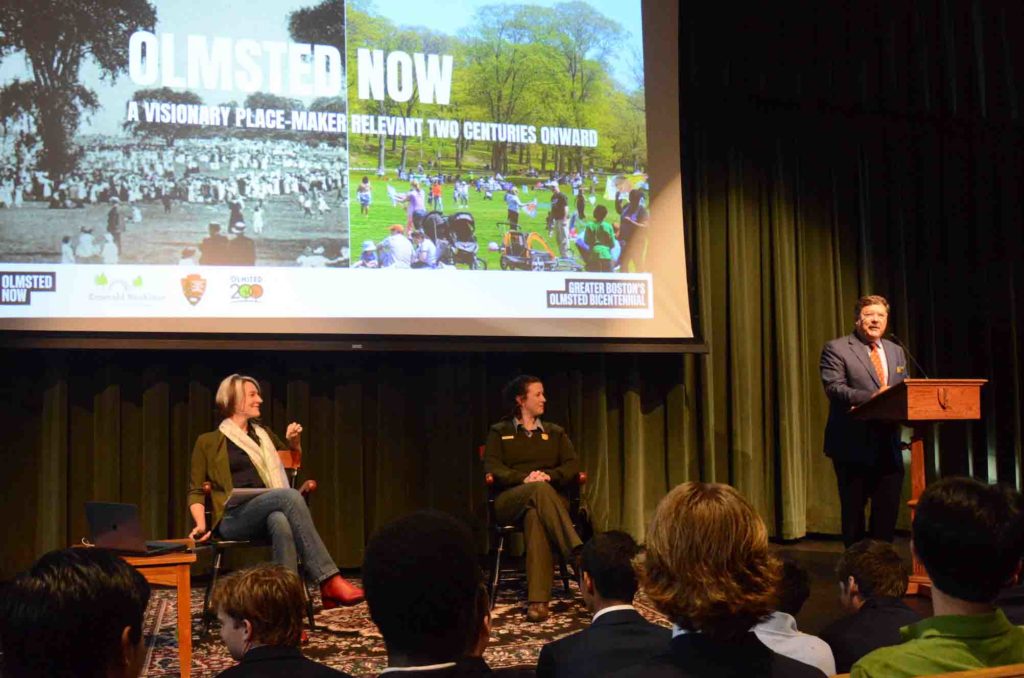Celebrating Frederick Law Olmsted’s Bicentennial
Frederick Law Olmsted, born in 1822, was a preeminent landscape architect, journalist, and social critic. Considered to be the father of landscape architecture, he was also the father of Roxbury Latin alumnus Frederick Law Olmsted Jr., Class of 1890. Olmsted Sr. is famous for co-designing many well-known urban parks throughout the United States and Canada, including Central Park in New York City and the Emerald Necklace here in Boston. His legacy is not just as someone who designed beautiful, natural spaces for the public to enjoy, but also as a visionary who helped shape American progress as it pertains to social and environmental challenges—someone who understood the powerful interplay between thoughtful and sustainable design, democratic spaces, and social justice.
On October 13, two individuals playing key roles in the national bicentennial celebration of the birth of Olmsted—Jen Mergel, Director of Experience and Cultural Partnerships for Boston’s Emerald Necklace Conservancy, and Brianne Cassetta, Supervisory Ranger at Frederick Law Olmsted National Historic Site—joined together to deliver an informative, energizing Hall in the Smith Theater.
“Frederick Law Olmsted was of his time and ahead of his time,” began Ms. Mergel, “launching ideas about open space, health, and truth through the lens of justice that we can still build on today.”
Ms. Mergel and Ms. Cassetta talked about Olmsted’s home and relevance in Boston, during his time and still today. One of his culminating, visionary projects was Boston’s Emerald Necklace—the string of greenspaces that connect neighborhoods across the city. He knew the capacity for Boston to grow outward, and he knew that in order to support that growth, and still maintain the City’s cohesion, he and his contemporaries had to remember that “it is practically certain that the Boston of today is the mere nucleus of the Boston that is to be.”
Ms. Cassetta and Ms. Mergel showed how Olmsted’s work prioritized shared use, shared health, and shared power. They described his founding of national organizations that are part of the fabric of American life today, like the American Red Cross and the National Park Service. They discussed his pivotal piece of writing, The Cotton Kingdom, which chronicled what Olmsted observed, and maligned, related to slavery in the southern United States. They emphasized that, as stewards of those priorities today, we have to work in partnership to support those ideals, seeded by Olmsted, 200 years later. Ms. Mergel and Ms. Cassetta—even in the format of their co-presenting—underscored that the nature of this ongoing work relies on partnerships.
Ms. Mergel, for over 20 years, has promoted inclusive engagement with contemporary art in museums, on campuses, and in the public realm, including exhibitions and programs at Boston’s Museum of Fine Arts, Institute of Contemporary Art, and, today, with Olmsted Now. Boston-born and based, Ms. Mergel aims to initiate, innovate, and collaborate on projects that foster curiosity, connection, and equity through the intersection of the arts with a wide range of disciplines.
In her role as a federal ranger of the National Park Service, Ms. Cassetta helps to protect and preserve areas of the National Park system, which includes making public lands inviting, inspiring, safe, and accessible. Her role also includes conducting educational programs for visitors of all ages and backgrounds about historical, natural, or scientific treasures protected by the U.S. Department of the Interior.
Olmsted 200 is the year-long celebration of the bicentennial of Olmsted’s birth, as well as a multi-faceted exploration of his living legacy. We were grateful to have with us two individuals who have been integral parts of the Olmsted 200 celebration, and who shared insight about Olmsted’s work—during his own time, and how it continues to resonate in important ways, including in the City of Boston, 200 years later.
“Olmsted reflected a powerful concern for ensuring our natural life supported and enhanced our quality of life,” concluded Headmaster Brennan in the morning’s Hall. “And like the air we breathe, everyone, regardless of his or her social standing or economic status, should have equal access to spaces and places that delighted, restored, and inspired them.”
Learn more about Olmsted 200 and Olmsted Now.

